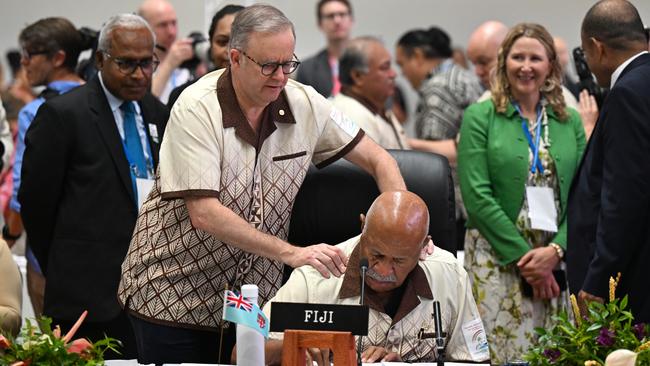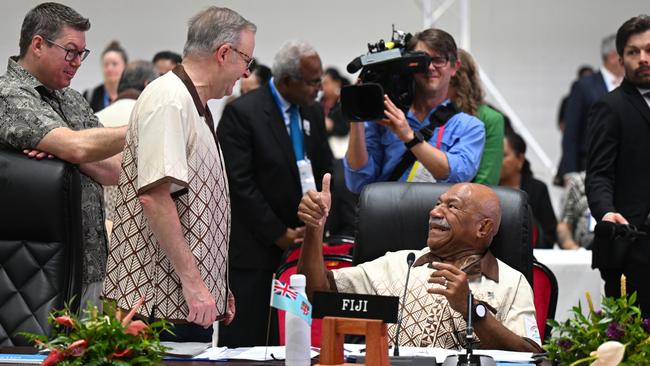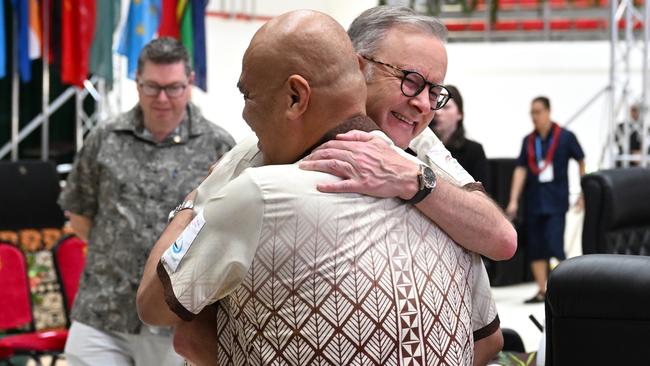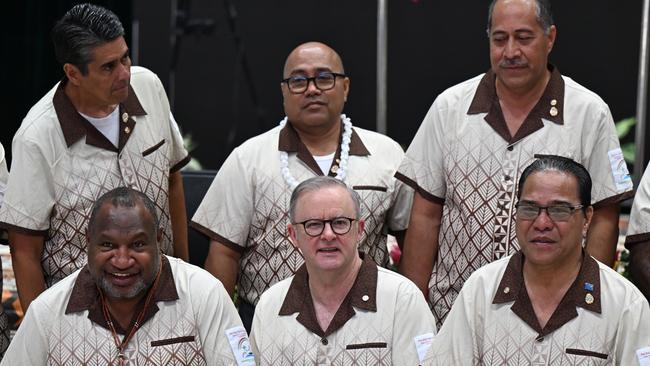Anthony Albanese tries his hand at soft-touch diplomacy at Pacific Islands Forum
The Prime Minister got up close and personal with Fiji leader Sitiveni Rabuka, as he sealed a major agreement with Pacific nations to create a region-wide police response force.

Anthony Albanese has sealed a major agreement with Pacific Island nations to create region-wide police response force, in a blow to China’s ambitions to expand its security support for the region.
Australian taxpayers will foot the bill for the “Pacific-led” initiative, paying $400m over the next five years to stand up a multi-country Pacific Police Support Group and establish new police training centres across the region.

The Prime Minister secured the diplomatic win at the Pacific Islands Forum in Tonga on Wednesday, as one of the region’s smallest states, Tuvalu, challenged Australia to abide by “the spirit” of the nations’ landmark climate and migration treaty signed last year.
Amid grumbling on the forum’s sidelines over the Albanese governmemnt’s plans to expand natural gas production, Tuvalu’s Prime Minister Feleti Teo urged Australia to “do what it has promised to the region in terms of its commitment to combat climate change”.
At least four police training centres will be opened in Pacific countries under the new law and order partnership, starting with Papua New Guinea, while a new co-ordination hub will be established in Brisbane to prepare Pacific police force members for regional deployments.
Forum members will contribute members to the standing police response force, which will be deployed to respond to civil unrest, natural disasters and major regional events.
“This policing initiative continues a long history of Pacific police forces working together to strengthen regional peace and security, and to support each other in times of need,” Mr Albanese said.
“The security of the Pacific is the shared responsibility of the Pacific region and this initiative benefits each of our nations.”
Mr Albanese won the support of regional counterparts for the initiative despite a warning by Vanuatu – one of China’s closest partner’s in the region.
“We need to make sure this (initiative) is framed to fit our purposes and not developed to suit the geo-strategic interests and geo-strategic denial security postures of our big partners,” Vanuatu’s Prime Minister Charlot Salwai said on Tuesday night.
Mr Salwai, who has held up finalisation of a bilateral security agreement with Australia, was backed by Melanesian Spearhead Group secretary-general Leonard Louma, who warned aspects of the plan remained “cryptic”.
PNG’s Prime Minister James Marape, who stood alongside Mr Albanese to announce the initiative, said it was vital to bring law and order to “the biggest unpoliced space on planet Earth”.

“It is a concept that is born from within. Security challenges are always present … whether it’s cyber security, high sea security or domestic security,” Mr Marape said.
Asked whether the agreement would preclude policing co-operation with China, Mr Marape said Australia “remains our security partner of choice, especially for policing matters”.
Fiji’s Prime Minister Sitiveni Rabuka said past police training had been a “godsend for us”, and it was time for the region to step-up and deal with its own security challenges.
“Most of the problems we face are regional problems, and the rest of the world, we believe (is) targeting our region. So it’s our responsibility to develop our own policing initiative,” Mr Rabuka said.
The “Pacific family” plan is a response to China’s attempt in 2022 to seal a region-wide security agreement with Pacific Island states, following its controversial security pact with Solomon Islands.
Australia also worked hard to prevent a China-PNG policing agreement earlier this year, before clinching a bilateral security agreement with Port Moresby.
Lowy Institute analyst and former diplomat in the region, Mihai Sora, said the agreement was a “massive achievement” at a time when regional unity was being tested and Pacific countries were facing a raft of threats from climate change and natural disasters to transnational crime.
“It’s a huge step forward for Pacific regional security co-operation, and it couldn’t have come soon enough, in terms of meeting regional needs,” Mr Sora said.
“Pacific countries are still free to pursue individual policing activities with other partners, of course. Sovereignty is paramount. But this initiative aims to fill those gaps in policing to which China purports to be responding.”
China’s state-owned Global Times warned earlier this week that the policing pact was designed to serve US strategic interests.
“Such an exclusive policing pact not only violates general principles in international relations, but also infringes on (Pacific island countries’) sovereignty to independently choose co-operation partners,” the outlet’s Australia analyst Chen Hong said.

There were suggestions at the forum that the regional policing group’s first deployment could be to Samoa in October when it hosts the Commonwealth Heads of Government Meeting.
It follows the deployment of police from Australia, PNG, Fiji, and New Zealand to Solomon Islands for its national election this year, and in 2023 when it hosted the Pacific Games.
On the sidelines of the forum, Mr Albanese and Mr Teo marked the official commencement of the Falepili Union treaty between Australia and Tuvalu.
The agreement requires Australia to come to Tuvalu’s aid in a crisis and offer 280 permanent visas to Tuvaluans each year, while giving Canberra a veto over any future security deals the micro-state wants to strike.
Mr Albanese said he had received “nothing but support” from regional counterparts for his climate policies, while defending his government’s gas plan as vital to securing the nation’s energy future.






To join the conversation, please log in. Don't have an account? Register
Join the conversation, you are commenting as Logout